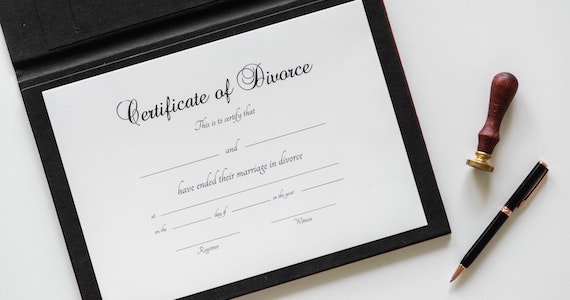Taking control of your finances post-divorce
Marriage breakdown can be highly traumatic and brings a whole new set of issues when it happens later in life. As well as the emotional challenges, there are practical issues to tackle, not least your finances. It’s all the more reason to get organised – a little bit of planning could help you take control of your financial future.
There’s no doubt a divorce takes a toll emotionally. However, there are also financial implications that can leave you feeling vulnerable, especially if you’re retired or approaching retirement.
So, what are some of the things you can do to take control of your finances if your marriage ends?

Understand your position
It’s important to get organised. It may feel confronting right now, but actively planning your future as a single person, taking into consideration your change in financial circumstances, can be highly beneficial later on.
First, you need to get to grips with your current finances. If you’ve been managing them jointly until now, you need to work out where you stand as an individual. That means asking yourself what you’ll be earning from this point onwards and what assets you have. You can then decide what you’ll realistically be able to afford in terms of your home and lifestyle.
A helpful way to track your current spending, and work out if it needs adjusting. It can help you establish exactly how you’re spending your money, so you can better understand your habits and outgoings, and start to consider any adjustments you can make.
Dividing up household wealth
Sizing up your finances also enables you to judge how your assets should be divided up. It will help you establish the net asset position of your family – what you both own and any debts you may have – and then you can hopefully have a conversation about what you both need and who gets what.
Planning for housing and associated costs is obviously a priority, as both of you will need a place to live. One option may be for both parties to downsize after selling the family home; another option may be for one to buy the other out. It’s important to understand the impact of your decisions and be comfortable with them. It can be a good idea to seek professional advice before making a decision on this scale.
Another issue to consider is tax, as not all assets are created equal. If one of you is keeping the family home while the other takes an investment property for example, you need to bear in mind that the family home will be tax-free in the event of a future sale while the investment property will attract capital gains tax. It can be a good idea to seek professional advice before making any decisions.
Taking legal advice
Obtaining legal advice is recommended so you can be very clear on where you stand both financially and legally. If your property is in joint names, for example, consider speaking to a solicitor about separating the property and also working out a plan to cover mortgage repayments during the settlement.
Revising your estate planning should also be considered. It may not be high on your list of priorities, but it’s one to keep in mind as people often forget to update their status following divorce. Additionally, think about updating your will, Powers of Attorney and any superannuation or insurance policy beneficiary nominations.
Protecting yourself
It may be that your partner was the one who looked after the finances prior to your divorce – or perhaps your separation has been less than amicable. Either way, it’s important that you find out exactly what’s what and take proactive steps to protect your finances, ensuring you’re now the one in control of your money. The government’s MoneySmartview1 website details some helpful things to consider, including:
-
closing off any joint bank accounts, including joint credit cards (this will require both owners to agree – although you can request the bank to temporarily freeze the account in the interim).
-
creating a new bank account for yourself to receive income and pay bills.
-
contacting your employer and/or anyone else who puts money into your account (for example Centrelink) to advise them of your new account details.
-
cancelling direct debits from the joint account and making alternative arrangements for payment of these bills.
-
cancelling any redraw facility on your home loan mortgage (to ensure your debt doesn’t increase).
-
updating your utility bills (if your name’s on the account, you may be liable for unpaid bills even if you’re no longer living there).
-
updating your rental agreement (if you move out and your name’s on the lease you may be liable for unpaid rent or damage caused by your former partner).
Retirement possibilities
Something for people who divorce later in life to consider is whether it will affect their retirement plans. For older couples, super is often their second biggest asset outside the family home. As part of the divorce settlement it may be possible to obtain a share of your partner’s accumulated super balance. Depending on the split of both your super and other assets, you may no longer have sufficient funds to maintain the retirement lifestyle you were once hoping for. As a result, you might need to reassess your spending and saving habits, or even consider returning to work or working longer than you once anticipated.
If this applies to you, don’t despair. Staying in the workforce can be an excellent way of developing new friendships and networks, on top of the satisfaction of continuing to apply your skills.
If you’ve reached Age Pension age however (currently 65.5), the reduction in your total assets could mean that you now qualify for a full or part Age Pension. This could supplement your income needs in retirement. If that’s a few years away, you might need to draw down on your savings until this becomes available.
Whatever you decide to do, it’s recommended you seek professional advice first.
Look after you
One of the best things you can do for yourself in the immediate aftermath of a divorce is take it easy and take good care of yourself.
Sleep, rest and gentle exercise can help protect and nurture your health. It’s also a good idea to keep in touch with friends and family, seeing them in person whenever you can.
Change can be frightening, but it can also be empowering and freeing. Take the time you need to acclimatise to the change, and trust that the future holds bright new things for you.
Please contact us on 07 3844 3899 if you seek further discussion on this topic.
National Australia Bank Limited. ABN 12 004 044 937 AFSL and Australian Credit Licence 230686. MLC Limited uses the MLC brand under licence. MLC Limited is a part of the Nippon Life Insurance Group and not part of the NAB Group of Companies. The information contained in this article is intended to be of a general nature only. Any advice contained in this article has been prepared without taking into account your objectives, financial situation or needs. Before acting on any advice on this website, NAB recommends that you consider whether it is appropriate for your circumstances.
Important:
Any information provided by the author detailed above is separate and external to our business and our Licensee. Neither our business nor our Licensee takes any responsibility for any action or any service provided by the author.
Any links have been provided with permission for information purposes only and will take you to external websites, which are not connected to our company in any way. Note: Our company does not endorse and is not responsible for the accuracy of the contents/information contained within the linked site(s) accessible from this page.


